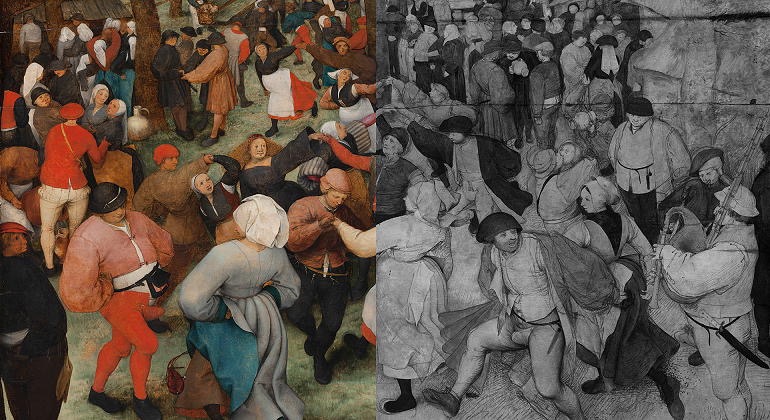Howsing

Pieter Bruegel the Elder: The Wedding Dance (1566)
" … new worlds emerge."
I caught myself, while proofing that latest manuscript, reading for something other than story. It's usual for me, when picking up a book, to read for content. Style might enter into my perusal, but never most prominently. I'm following the story, hoping that the author's word and phrasing choices won't unduly encumber my effort. Ideally, when reading, the style should remain essentially invisible, like a neutral wall color, there to frame the content never to overshadow it. But proofing my own writing, I already know the story. I'm learning that the story pretty much takes care of itself. This time through the work, I'm looking a little deeper than story at the technique, the style, the manner of describing I employed. Does it exhibit the necessary consistency? Does it encumber the story? Does it adequately hold the space? ©2022 by David A. Schmaltz - all rights reserved
I guess that the style of writing sets a context, and context tends to deeply influence everything around it. Context can't stand on its own, but everything around it seems utterly dependent upon its consistent presence. Perhaps it lends the tone, the levity or gravitas, the access to the story. This was not immediately obvious to me. At first, I thought that I was reviewing the story, but over time, as I engaged, I came to appreciate that the stories were already clear, that they were just what they were, but that the underlying structure might need reviewing, for that structure seems more emergent than imbedded, and no one's wise to rely upon inadvertency for their structure. I nosed in under the blanket to discover what huddled under there.
Word choice huddled there. When writing, I string meanings between certain axis points, certain words which seem to anchor something. Each of these anchor points first appear almost as templates, spaces where any word might appear. I notice myself quickly choosing, based upon more than mere meaning, but also upon rhythm, assonance, rhyme, and tone. The choice I make nudges the piece into a unique direction toward another pivot point word, the whole essay emerging fractally. I can usually see how well each choice fulfills the overall meaning and purpose when I first reread what I've written, but I'm finding that some distance better prepares my eye to catch subtle anomalies. How did I tell this story? How might I have told it better? Distance seems to improve my responses to these questions.
But this requires a different focus. The ennui I experienced when starting through this latest Proofing exercise might have just been me faunching at the expectation that I would reread overly familiar stories. By refocusing upon the Howsing, the Hows of how I told the story, they become sparkling new to me. I'd not really experienced them from that perspective before. I'm discovering rather than redoing anything. Howsing induces a different trance than does story reading. The meanings become less important. I can't really care whether the butler did it. I immerse myself within an alternate focus where the story hangs in the slight background and the usual background takes more center stage. I remove the color and see structure beneath. I do not know what else to say about the experience except that it feels really different, as if I might be adding value rather than simply repeating something long ago relegated to the finished pile.
I suspect that each subsequent stage of the Authoring process might require some slightly different focus, some fresh way of perceiving what I'm working with, such that I've focused upon most of the facets of it by the time I'm through the gauntlet. It's not simply repeat performances, but shifting focuses, slightly almost unique experiences rather than a succession of do-overs. Once the writing's finished, new worlds emerge.


